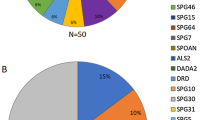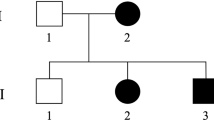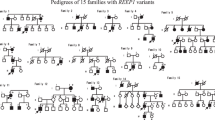Abstract
SPG4 mutations are the most frequent cause of autosomal-dominant hereditary spastic paraplegia (HSP). SPG4 HSP is characterized by large inter- and intrafamilial variability in age at onset (AAO) and disease severity. The broad spectrum of SPG4 mutations has recently been further extended by the finding of large genomic deletions in SPG4-linked pedigrees negative for ‘small’ mutations. We had previously reported a very large pedigree, linked to the SPG4 locus with many affected members, which showed gender difference in clinical manifestation. Screening for copy number aberrations revealed the first case of a multi-exonic duplication (exon10_12dup) in the SPG4 gene. The mutation leads to a premature stop codon, suggesting that the protein product is not functional. The analysis of 30 individuals who carry the mutation showed that males have on average an earlier AAO and are more severely affected. The present family suggests that this HSP pathogenesis may be modulated by factors related to individual background and gender as observed for other autosomal dominant conditions, such as facio-scapulohumeral muscular dystrophy or amyloidosis. Understanding why some individuals, particularly women, are ‘partially protected’ from the effects of this and other pathogenic mutations is of utmost importance.
Similar content being viewed by others
Log in or create a free account to read this content
Gain free access to this article, as well as selected content from this journal and more on nature.com
or
References
Fink JK : Hereditary spastic paraplegia. Curr Neurol Neurosci Rep 2006; 6: 65–76.
Fonknechten N, Mavel D, Byrne P et al: Spectrum of SPG4 mutations in autosomal dominant spastic paraplegia. Hum Mol Genet 2000; 9: 637–644.
Beetz C, Zuchner S, Ashley-Koch A et al: Linkage to a known gene but no mutation identified: comprehensive re-analysis of SPG4 HSP pedigrees reveals large deletions as the sole cause. Hum Mut 2007; 28: 739–740.
Starling A, Rocco P, Passos-Bueno MR, Hazan J, Marie SK, Zatz M : Autosomal dominant (AD) pure spastic paraplegia (HSP) linked to locus SPG4 affects almost exclusively males in a large pedigree. J Med Genet 2002; 39: e77.
Beetz C, Nygren AO, Schickel J et al: High frequency of partial SPAST deletions in autosomal dominant hereditary spastic paraplegia. Neurology 2006; 67: 1926–1930.
Svenson IK, Kloos MT, Gaskell PC et al: Intragenic modifiers of hereditary spastic paraplegia due to spastin gene mutations. Neurogenetics 2004; 5: 157–164.
Evans KJ, Gomes ER, Reisenweber SM, Gundersen GG : Lauring: Linking axonal degeneration to microtubule remodeling by Spastin-mediated microtubule severing. J Cell Biol 2005; 168: 599–606.
Yip AG, Durr A, Marchuk DA et al: Meta-analysis of age at onset in spastin-associated hereditary spastic paraplegia provides no evidence for a correlation with mutational class. J Med Genet 2003; 40: e106.
Zatz M, Marie SK, Cerqueira A, Vainzof M, Pavanello RC, Passos-Bueno MR : The facioscapulohumeral muscular dystrophy (FSHD1) gene affects males more severely and more frequently than females. Am J Med Genet 1998; 77: 155–161.
Bornebroek M, Westendorp R, Haan J et al: Mortality from hereditary cerebral haemorrhage with amyloidosis – Dutch type. The impact of sex, parental transmission and year of birth. Brain 1997; 120: 2243–2249.
Acknowledgements
We thank the family members for participating in the study. This research was supported by FAPESP-CEPID, CNPq and the Tom-Wahlig-Stiftung.
Author information
Authors and Affiliations
Corresponding authors
Additional information
Supplementary Information accompanies the paper on European Journal of Human Genetics website (http://www.nature.com/ejhg)
Supplementary information
Rights and permissions
About this article
Cite this article
Mitne-Neto, M., Kok, F., Beetz, C. et al. A multi-exonic SPG4 duplication underlies sex-dependent penetrance of hereditary spastic paraplegia in a large Brazilian pedigree. Eur J Hum Genet 15, 1276–1279 (2007). https://doi.org/10.1038/sj.ejhg.5201924
Received:
Revised:
Accepted:
Published:
Issue date:
DOI: https://doi.org/10.1038/sj.ejhg.5201924
Keywords
This article is cited by
-
A clinical and genetic study of SPG31 in Japan
Journal of Human Genetics (2022)
-
Genetic, clinical and biochemical characterization of a large cohort of patients with hyaline fibromatosis syndrome
Orphanet Journal of Rare Diseases (2019)
-
Mutational Spectrum of Spast (Spg4) and Atl1 (Spg3a) Genes In Russian Patients With Hereditary Spastic Paraplegia
Scientific Reports (2019)
-
Delving into the complexity of hereditary spastic paraplegias: how unexpected phenotypes and inheritance modes are revolutionizing their nosology
Human Genetics (2015)
-
Where genotype is not predictive of phenotype: towards an understanding of the molecular basis of reduced penetrance in human inherited disease
Human Genetics (2013)



